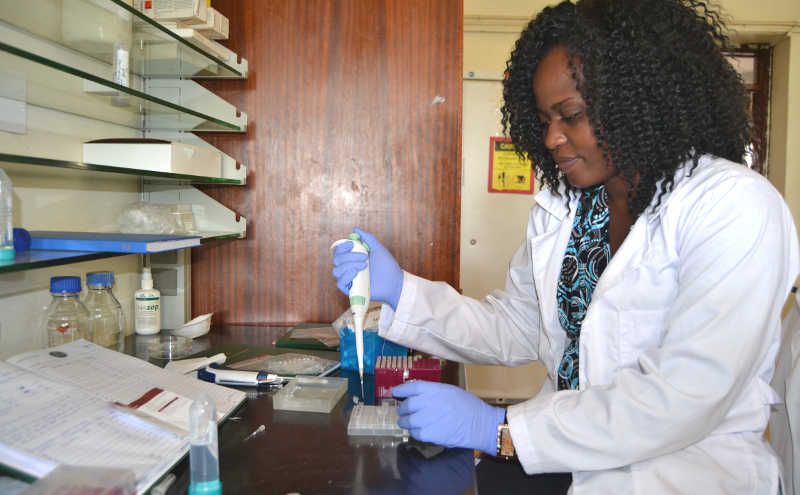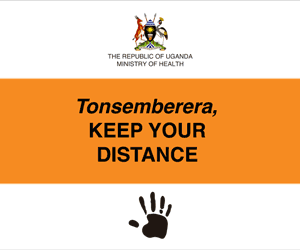

One of Uganda’s many young scientists at work at the National Crops Resources Research Institute (NaCRRI)
Uganda is on board the current global race for vaccines and drugs to manage the highly-infectious Coronavirus/COVID-19, government technocrats and scientists involved in the exercise have revealed.

In some of his recent updates to the nation about the COVID-19 outbreak, President Yoweri Museveni said his his government was working with researchers to contribute to the global effort of finding a vaccine or treatment against the COVID-19 pandemic.
This writer has learnt that Ugandan researchers are using a two-pronged approach of using medical and alternative [traditional] medicine approaches to try to find a solution to the COVID-19 pandemic.
According to medical experts, parallel research projects have been initiated to offer the country multiple outcomes with both pharmaceutical and herbal-based affordable products/services, derived from locally-available sources.
Innovators asked to turn up
The Ministry of Science, Technology and Innovations (MoSTI) has set up a “MoSTI COVID-19 Science Research and Innovation Task Team for Innovative Solutions” towards the fight against/control the pandemic in Uganda, states an official document seen by this writer.
It is signed by the MoSTI Permanent Secretary, David Obong. He states that his Ministry requires researchers to devise innovative solutions to be used to prevent, control or manage the pandemic.
“COVID-19 is a new infectious disease of the respiratory system caused by severe acute respiratory syndrome (SARS-CoV-2). In light of this, the Ministry ……. invites brief costed concept notes from members of MoSTI COVID-19 Science Research and Innovation Task Team in Uganda…” the document deadlined April 19, states.
He expects researchers to play a ‘fundamental role’ in creating an understanding of the emerging and re-emerging infectious diseases like COVID-19. He outlines key thematic areas expected of scientists to focus on, in the solicited research viz: Hygiene [for sanitizers], Equipment/infrastructure [e.g. personal protective equipment (PPEs) and novel testing platforms and ventilators; Diagnostics [e.g. rapid diagnostic test-kits] and Epidemiology [e.g. contact tracing, surveillance or related digital applications].
The other thematic areas are: Therapeutics [e.g. drugs and vaccines], and any other health-related innovations in line with prevention/testing/epidemiology/treatment of COVID-19.
According to MoSTI plan, researchers are not expected to undertake this work under any other funding or support currently on, and the research should, in the short term, deliver results under three months.
MUK not left behind
Likewise, Makerere University last month issued a call to staff interested in participating in the development of a vaccine, to express their interest. Renowned medical Professor, Vinand Mukatabala Nantulya [the former chairman of the Uganda AIDS Commission], is Principal Investigator (PI) for the university-led anti-COVID vaccine research from anti-bodies [plasma] of recovered patients. Dr. Musenero confirmed this while appearing on a local TV May 22.
She said: “Yes we’ve assembled four teams to come up with four vaccine candidates. Though some of the machines we need are not in the country, the president has authorized expedited procurement… efforts have started and in one of the approaches, we can get blood samples of the recovered patients who’ll become immune; we can purify that blood for plasma with which to quickly treat people.”
Prof. Nantulya, a physician, pathologist, medical researcher, entrepreneur and academic administrator, has over 20 years of research career and leadership. Nantulya developed a vaccine called Kuku Star, that prevents New Castle Disease in chicken.
He manufactures the vaccine in his company, Brentec Vaccine Ltd. His other company, Astel Diagnostics Ltd, manufactures rapid diagnostic tests against a number of diseases. He serves as a senior advisor on Vaccines and Pharmaceuticals to the President of Uganda.
The role of alternative medicine
Meanwhile, the other ongoing research is by an autonomous body, the State-owned Wandegeya-based National Chemotherapeutic Research Institute (NCRI). NCRI’s Director Dr. Grace Nambatya, told this writer that a team she’s part of, is spearheading research for a herbal-based treatment with support from the Office of the President.
“Yes, we’re working on a therapy that derives its healing properties from our rich natural resources. We presented our concept directly to State House on the request and encouragement by President Yoweri Museveni.
We hope that by the end of June 2020, we shall have our products ready,” Dr. Nambatya said last week.
Dr. Nambatya says a team for a herbal-based therapy is led by Dr. Monica Musenero, an Epidemiologist, Veterinarian and Presidential aide on Severe Epidemics/Pandemics, as the Principal Investigator (PI). Dr. Musenero, fondly known as “the pandemics warrior” has served widely in the fight against epidemics like the 2013-16 ebola outbreak in Guinea, Sierra Leone and Liberia; Ebola in Uganda and the DR Congo.
She is affiliated to the Kampala-based African Field Epidemiology Network (AFENET).
In a guarded explanation of their work, Dr. Nambatya says they already have powerful herbal-based anti-viral, anti-fungal and anti-bacterial protocols for a wide-range of therapies—now undergoing improvement, combinations and trials, for latter evaluation for human trials against coronavirus and COVID-19 infection.
“Its multi-purpose formulations; some are anti-malarials, others are Vitamin-based immunity-boosters—vital in treatment of people faced with the virulent coronavirus which is manifesting in humans for the first time….
We’re hopeful that Government support will enable us move fast and come up with COVID-19 remedies. We’re not wasting any time,” says Nambatya.
A silent war with ‘western medics’
The latest COVID crisis has resurrected the mistrust and mutual suspicion between western trained medical practitioners and proponents of alternative medicine.
Dr. Nambatya has used the current effort to find a solution for COVID to illustrate the frustrations and push-back propagated by the mainstream health sector technocrats as one of the major challenges faced by those in the alternative medicine sector.
She moaned the fact that some technocrats do not believe the fact that natural compounds and herbal formulations can offer solutions for COVID-19 and other virulent ailments.
Before it became independent, the NCRI, known as the Natural Chemotherapeutic Research Laboratories (NCRL), was a unit directly under the Health Ministry. “Our growth and opportunities were for so long stifled by heavy bureaucracy because many of our people are brainwashed that we shall always get medical solutions to our health problems from elsewhere outside Uganda.
So close to ten years, we’ve struggled through thick and thin to give this very vital institution autonomy. We achieved it six years ago, and now make and market a wide-range of health products and services,” said Nambatya.
In 2014, she explained, the former NCRL got an Act of Parliament for autonomy that upgraded it to NCRI. “We now get funds directly approved by Parliament. This greatly improved our human, financial and infrastructural capacity to undertake research and development of natural resources. Our drive against COVID-19 is the long experience in fighting viral epidemics and we’re inspired by the human motivation.
We’re confident we shall come up with a useful anti-COVID-19 product or set of products,” said the NCRI boss.
However, Prof. Freddie Ssengooba, the Head of Government’s Adhoc Committee on policy implications of COVID-19, told a local Kampala weekly, The Observer newspaper, that at the moment, the advisory team cannot recommend use of alternative medicines because these need to go through a rigorous approval process before the medicine is made available to the public.
“It is important that innovators find a way to register their work with government so that their innovations are guided to the right conclusion. This being a new disease, the president is also keen to see Uganda becomes more self-sustaining,” Ssengooba stated.
For now, he adds, we should be encouraging scientists and traditional herbalists to follow the right channels of presenting their work. But Dr. Nambatya reaffirms NCRI’s capacity to offer quality solutions and equates her institution’s status to that of Kenya Medical Research Institute (KEMRI)—widely renowned for fighting HIV/AIDS among other epidemics. Nambatya also revealed that with its own-generated revenue, NCRI is already producing other anti-COVID products, like cotton-based face masks, sanitary pads, test-kits and sanitizers.
Obstacles facing researchers
Recent trends in drug discoveries worldover, according to Sam Opio, the Secretary to the Pharmaceutical Society of Uganda involves the use of recombinant DNA or gene-targeting.
“The most widely used procedure now involves the use of recombinant genes. Desired characteristics are added to a persons’ DNA to address certain health conditions,” Opio told the Uganda Bioscience Media Cafe in 2015.
Since making those comments, the world has witnessed an explosion in the production of DNA-based drugs in treating major diseases. The latest solution was the vaccine against Ebola that was made from a Tobacco gene.
Scientific sources have intimated to this writer that while the Uganda Government has dilly-dallied with enacting a biosafety law, to regulate and permit release of products of modern biotech, most of the ongoing research for vaccines currently uses biotechnology tools and techniques of genetic engineering.
Dr. Andrew Kiggundu, a renowned agricultural researcher with expertise in developing disease-resistant plant varieties using modern biotechnology (GMOs) argues that: “In my opinion the only way life will return to normal is when a vaccine becomes available, to allow crowded schools, airplanes, churches and stadiums to resume. One place I know possessing capacity to develop vaccines in Uganda, is Makerere University’s College of Veterinary Medicine, especially animal vaccines which they’ve made. “Maybe a consortium of Ugandan scientists can be arranged, including biotechnologists, to put in place capacity. Ugandan consortia could partner by developing mass production facilities so that when a vaccine is developed, it is quickly mass-produced cheaply and locally. Pathogens such as coronaviruses continue to evolve through time, thus, scientists are forced to double their efforts to combat diseases, particularly COVID-19, with the aid of every instrument in our global health technology toolbox including plant-based techniques,” says
The Director Uganda Virus Research Institute (UVRI) Dr. Ponsiano Kaleebu also told the media in Kampala recently that the only safe way to manage COVID-19 is by vaccines.
“Until the vaccine is made available, we can avoid the disease by adhering to measures issued by government. For more than 10 years, we’ve been running a national influenza and respiratory surveillance programme. We have a comprehensive treatment protocol for the country, that’s going to be used in our research environment,” says Kaleebu.














Peter Wamboga-Mugirya
Mr. Peter Wamboga-Mugirya is a veteran journalist. He currently works as the Director of Communications and Outreach at the Science Foundation for Livelihoods and Development www.scifode-foundation.org based in Kampala
Leave a Comment
Your email address will not be published.